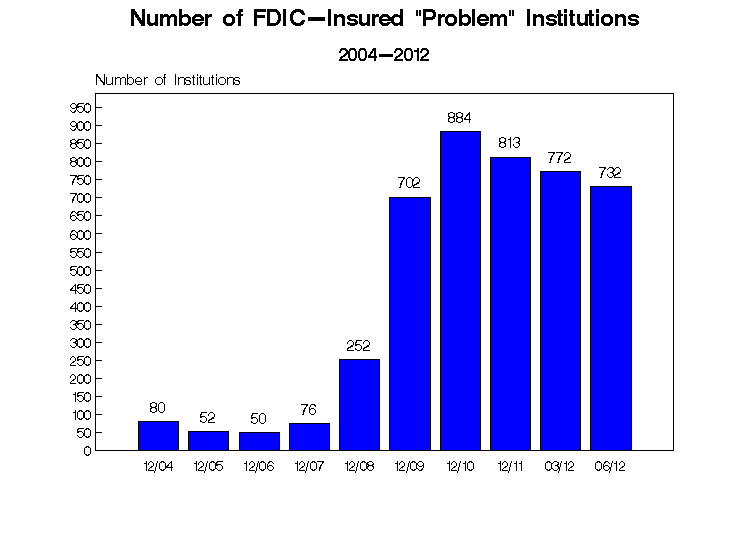 The FDIC announced today that it took enforcement actions against a total of 56 banks and individuals during July 2012. During the previous month, the FDIC issued 48 enforcement actions.
The FDIC announced today that it took enforcement actions against a total of 56 banks and individuals during July 2012. During the previous month, the FDIC issued 48 enforcement actions.
The July enforcement actions included 13 civil money penalties, 3 prompt corrective action notices, 5 consent orders, 8 section 19 orders, 12 removal and prohibition orders and 14 terminations of consent and cease and desist orders.
Despite the fact that we are now five years past the beginning of the banking and financial crisis that began in 2007, over 10% of all banks are still on the FDIC unofficial Problem Bank List. In the quarter ending June 30, 2012, a total of 732 banks were listed as problem banks, down slightly from 772 in the previous quarter. The FDIC currently insures deposits at a total of 7,309 banks and savings associations.
 Banks on the issuing end of FDIC enforcement actions are typically problem banks that have a variety of managerial and financial problems. Despite the large amount of financial assistance provided to troubled banks by numerous government programs, the number of problem banks remains stubbornly high. Banks that need additional capital are having a tough time finding investors due to the poor economy, increased and expensive regulatory burdens and low loan demand.
Banks on the issuing end of FDIC enforcement actions are typically problem banks that have a variety of managerial and financial problems. Despite the large amount of financial assistance provided to troubled banks by numerous government programs, the number of problem banks remains stubbornly high. Banks that need additional capital are having a tough time finding investors due to the poor economy, increased and expensive regulatory burdens and low loan demand.
As described in a previous post, consent orders are issued to banks that are considered to be operating in an “unsafe and unsound” manner. Much more serious is a prompt corrective action (PCA) notice which requires a bank to take immediate corrective actions regarding capital adequacy. Many banks issued a PCA wind up being subsequently closed by regulators.
A consent order is issued by the FDIC when regulators determine that a bank is operating in an “unsafe or unsound” manner. A bank signing a consent order is required to take corrective actions for the deficiencies cited in the consent order. If a bank is able to cure the deficiencies cited in the consent order, the FDIC can terminate the order.
A prompt corrective action notice (PCA) requires a bank to take immediate actions to address serious managerial or financial deficiencies. A PCA is a much more serious action than a consent order and is typically issued to a capital impaired bank that is in serious financial difficulty. A bank issued a PCA is classified as undercapitalized, significantly undercapitalized or critically undercapitalized and operating in an unsafe and unsound manner. Many of the banks issued prompt corrective action notices are unable to raise additional capital and wind up being closed by regulators.
The three banks receiving prompt corrective action notices during July are as follows:
1. Jasper Banking Company, Jasper, GA
2. Georgia Trust Bank, Buford, GA
3. Banks of Wisconsin, Kenosha, WI
Please note that both Jasper Banking Company and Georgia Trust Bank were closed by regulators during July.
The five banks issued consent orders during July are as follows:
1. The Bank of Southern Connecticut, New Haven, CT
2. The Peoples Bank, Eatonton, GA
3. Mid-City Bank, Inc., Omaha, NE
4. The Peoples Bank, Covington, GA
5. First Community Bank of Crawford County, Van Buren, AR
The full list of enforcement actions issued by the FDIC during July can be viewed at FDIC Enforcement Decisions and Orders.
Speak Your Mind
You must be logged in to post a comment.